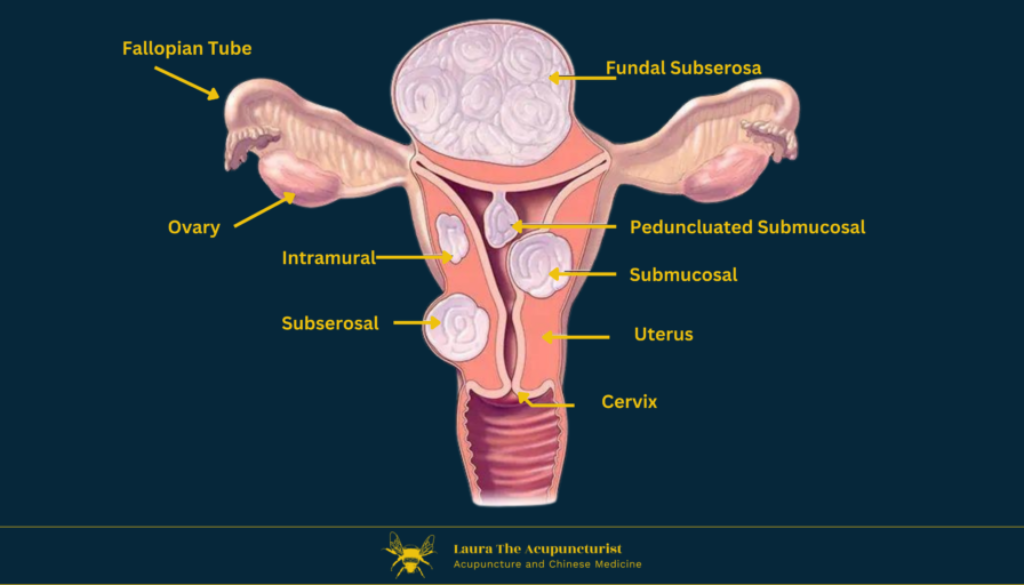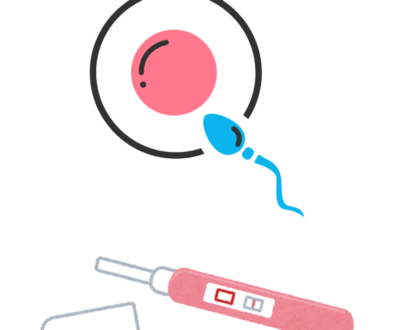Fibroids: What Are They and How Can TCM Help?
Fibroids are a common condition that affects many women, particularly those of reproductive age. They can be a source of discomfort and pain, and they may also impact fertility and overall well-being. In this blog, we’ll explore what fibroids are, the different types, their symptoms and diagnosis, and how Acupuncture and Chinese herbal medicine can offer support and relief.
What Are Fibroids?
Fibroids, also known as uterine fibroids or leiomyomas, are non-cancerous growths that develop within the muscular wall of the uterus. They are made up of smooth muscle cells and fibrous connective tissue and can vary in size from being as small as a seed to as large as a melon. While the exact cause of fibroids remains unclear, hormonal factors (particularly oestrogen and progesterone) and genetic predispositions are believed to play significant roles.
Types of Fibroids
Fibroids can grow in different parts of the uterus, and their classification depends on their location:
-
Intramural Fibroids: These are the most common type of fibroid. They grow within the muscular wall of the uterus, which can cause the uterus to become larger and can lead to heavy menstrual bleeding or pain.
-
Submucosal Fibroids: These fibroids develop just beneath the lining of the uterine cavity and can protrude into the uterus. They can affect the menstrual cycle and are often linked to heavy bleeding and fertility issues.
-
Subserosal Fibroids: These grow on the outer surface of the uterus. As they expand, they can put pressure on surrounding organs like the bladder or rectum, causing discomfort and other symptoms.
-
Pedunculated Fibroids: These are fibroids that grow on a stalk, either inside the uterine cavity or on the exterior of the uterus. They can cause sharp pain if the stalk becomes twisted.
Symptoms of Fibroids
The symptoms of fibroids can vary greatly depending on their size, number, and location. Some women may not experience any symptoms at all, while others may have significant symptoms such as:
-
Heavy Menstrual Bleeding: This is one of the most common symptoms of fibroids. The heavy bleeding can sometimes lead to anaemia.
-
Pelvic Pain or Pressure: Fibroids can cause persistent pelvic discomfort or pressure, often described as a feeling of fullness or heaviness in the lower abdomen.
-
Frequent Urination: If fibroids press on the bladder, they can lead to increased frequency of urination.
-
Pain During Intercourse: Depending on the location of the fibroids, sexual intercourse may be painful.
-
Lower Back or Leg Pain: Large fibroids can press on the nerves and muscles in the lower back or legs, causing pain.
-
Fertility Issues: Submucosal fibroids, in particular, can interfere with the implantation of an embryo and can be a contributing factor in infertility or recurrent miscarriage.
Diagnosis of Fibroids
Fibroids are typically diagnosed through imaging techniques, including:
-
Ultrasound: This is the most common method to detect fibroids, using sound waves to create images of the uterus.
-
MRI (Magnetic Resonance Imaging): An MRI may be recommended for a more detailed view of fibroids, especially when planning surgery.
-
Hysteroscopy: A procedure where a small camera is inserted into the uterus to allow the doctor to see fibroids directly.
Conventional Treatments of Fibroids
While fibroids are non-cancerous and often do not pose a serious health risk, they can impact a woman’s quality of life, depending on their size and symptoms. They may lead to significant menstrual problems, anaemia due to heavy bleeding, and in some cases, fertility issues. Treatment options in conventional medicine include medication to control symptoms, hormone therapy, or surgery such as myomectomy (removal of fibroids) or, in more severe cases, hysterectomy (removal of the uterus).
How TCM Can Help with Fibroids
In Traditional Chinese Medicine, fibroids are often linked to Liver Blood Stagnation. According to TCM, the Liver is responsible for maintaining the smooth flow of Qi and blood. When the Liver becomes imbalanced, often due to stress, poor diet, or lack of exercise, blood flow can become stagnant, leading to conditions like fibroids. TCM takes a holistic approach to address the root cause of fibroids, focusing on restoring balance within the body.
Acupuncture for Fibroids
Acupuncture can be highly effective in managing fibroid symptoms by promoting the movement of blood and Qi, which helps reduce stagnation. Some of the benefits of acupuncture for fibroids include:
-
Reducing Pain and Discomfort: Acupuncture can help relieve pelvic pain and pressure associated with fibroids by improving blood circulation and reducing inflammation.
-
Regulating Menstrual Flow: By balancing hormones and supporting the proper function of the reproductive system, acupuncture can help regulate heavy menstrual bleeding, easing the burden of fibroid-related symptoms.
-
Stress Reduction: Stress is often a key factor in Liver Qi stagnation. Acupuncture sessions can help lower stress levels, thereby reducing the chances of further Liver imbalances and fibroid growth.
Chinese Herbal Medicine for Fibroids
Chinese herbal medicine is another powerful tool in managing fibroids. Herbal formulas are tailored to the individual’s specific diagnosis and are designed to support blood movement, reduce stagnation, and nourish the organs involved. For fibroids, the herbs often focus on:
-
Breaking Down Stagnant Blood: Herbs that invigorate the blood and dissolve stasis are commonly used in the treatment of fibroids, particularly in cases of Liver Blood Stagnation.
-
Balancing Hormones: Some herbal remedies can help regulate hormone levels, reducing excess oestrogen, which is often implicated in fibroid growth.
-
Strengthening the Spleen and Kidneys: Supporting these organs ensures that the body is able to effectively manage and regulate blood flow, preventing the formation of new fibroids.
Lifestyle and Dietary Recommendations
To complement acupuncture and herbal treatment, making certain lifestyle and dietary changes can be beneficial:
-
Diet Rich in Greens: Green leafy vegetables help promote Liver health and ensure smooth blood flow.
-
Avoid Excessive Cold Foods: Cold foods can contribute to stagnation, especially in the Liver and Spleen. It’s better to consume warm, cooked foods that nourish the body.
-
Reduce Alcohol and Caffeine: Both can negatively impact the Liver and contribute to Qi stagnation.
-
Manage Stress: Mind-body practices like tai chi, qigong, and yoga can help relieve stress, which plays a major role in Liver Qi stagnation.
Final Thoughts
Fibroids can be a challenging condition to deal with, especially when they cause discomfort, pain, or impact fertility. Traditional Chinese Medicine offers a holistic approach to managing fibroids, focusing on restoring balance within the body rather than merely addressing the symptoms. Acupuncture and Chinese herbal medicine, combined with positive lifestyle changes, can help alleviate symptoms, reduce the size and growth of fibroids, and support overall reproductive health.
If you are struggling with fibroids and are looking for a more natural and holistic approach, consider reaching out to a TCM practitioner who can create a treatment plan tailored to your specific needs. With patience and consistency, TCM can be a valuable ally in your journey to wellness and balance.




